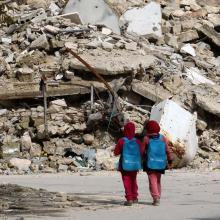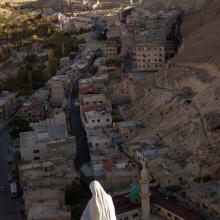Assad
"Even beautiful babies were cruelly murdered in this very barbaric attack," President Donald Trump said of Tuesday's chemical weapons strike, which Western countries blame on Assad's forces. "No child of God should ever suffer such horror."

Image via Jordi Bernabeu Farrús/Flickr
“This is one of the most difficult days in Aleppo’s history,” Ibrahim Abdul Laith told Sojourners over a series of WhatsApp voice notes. “We endured difficulties under the shelling, and under the siege, but even though the situation was difficult, we were fighting for our city.”
Later in the messages, his voice took on a somber tone.
“Now we are being asked to leave.”

Image via Adwo / Shutterstock
The Syrian crisis is escalating in unnerving ways with the arrival of Russian troops and the beginning of direct Russian military intervention. What had been a local and regional humanitarian disaster now risks becoming a superpower confrontation between Russia and the United States. Undoubtedly the introduction of Russian firepower on the scene will bring more civilian suffering, dislocation, and death.
If I were looking for handles for prophetic preaching on the Syria situation, I might select the following.
IN EARLY SEPTEMBER, President Obama told the American people that the use of chemical weapons by Bashar al-Assad of Syria was a moral atrocity that required international consequences.
Religious leaders agree with the necessity of a determined response to the Assad regime, which is responsible for the deaths of 100,000 of his own people, including the brutal use of chemical weapons on civilians. But many faith leaders are asking tough moral questions about what that response should look like.
We fundamentally reject the assumption that refraining from military action is “doing nothing.” We need more imagination and a deeper response than the traditional one of military strikes, which haven’t proven effective and almost always have serious unintended consequences, risk dangerous escalations, and consistently create more suffering for innocent civilians.
As religious leaders, we are called to peacemaking, not just peace loving, which requires harder and more imaginative work than merely falling into old habits of military “solutions.” Our priorities should be to mobilize global support for the many vulnerable Syrians—including the millions of refugees—and to do the hard work of conflict resolution that could lead to a political solution.
A huge statue of the Virgin Mary towers over churches, monasteries and mosques in the Syrian city of Maaloula, where a dialect of the Aramaic language of Jesus is still spoken.
The town has managed to stay out of the Syrian conflict between Sunni Muslim rebels and the regime of dictator Bashar Assad, as have most of Syria’s 2 million Christians.
But worsening violence has forced the community into a corner: Continuous clashes between the rebels and the regime in this isolated town of 2,000 people as well as other Christian towns over the past two weeks have many Christians worried that they will no longer be allowed to stay neutral.


